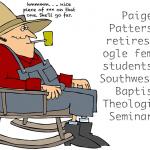 What broken windows can we fix in The United Methodist Church? Perhaps if we found one, we could find The Way Forward.
What broken windows can we fix in The United Methodist Church? Perhaps if we found one, we could find The Way Forward.
Can life be entirely fair?
I started wondering that yesterday when my husband and I decided to have lunch at a new restaurant in our area. My routine question: “Do you have a gluten-free menu?”
The routine answer, “No, but some items are marked with the (tiny, nearly impossible to see) symbol.” And, as is the case with so many US restaurants, I’m often consigned to a slice of grilled chicken or salmon over greens or a charcuterie plate, but without bread.
Not terrible, but it does get a bit boring.
I found just the opposite in both Ireland and England. There, chefs of both big and small restaurants would bend over backward to fix me whatever I wanted on the menu, adjusting the recipes as necessary. Even the ever-present fish and chips are now routinely made gluten-free. And without extra cost to me.
Yesterday was just one of those times when I found myself particularly weary of fighting the battle to stay healthy. And on a side-note here: I’ve all but given up on finding a safe gluten-free Service of Holy Communion. Again, in British churches, this is a complete non-issue.
But it’s not exactly fair.
However, when has life been fair? That hit me again this morning when I saw an article in the New York Times about clothing chains charging more for “plus-sized” women’s clothing (larger men apparently are excluded from this disadvantageous pricing). Since the average woman in developed countries now verges on the “plus-sized” line, this strategy can be a financial bonanza for clothing retailers.
As one customer notes: “Obviously it costs more to make plus-size clothing because of the amount of fabric used, but if the pricing metric is going to be based on size, then every size should be priced differently,” she said in a phone interview on Wednesday.
“If smaller-sized people aren’t getting discounts, then plus-sized people shouldn’t have to pay a surplus,” she added. “We rarely see ‘tall’ and ‘maternity’ editions of clothing being priced differently. It’s cruel and unfair to single out one body type.”
No, it’s not fair. But, frankly, some discriminatory practices are far more destructive than others, especially gender-based, racial and ethnic practices that work to keep specific people groups forever oppressed.
So how much energy should we put in the “less important” practices? Or, if we took the “less important practices” more seriously, could it end up having a significant impact on the more seriously destructive practices?

I wonder if the “broken-window” theory applies here: fix some small things and see a magnified impact on larger societal issues.
The UMC: Many Broken Windows
Let’s pull this around to the increasingly disturbing situation within the United Methodist Church. To recap: the UMC sits on the edge of the abyss of schism and probable destruction over issues of sexuality and Biblical interpretation.
In addition, female clergy, already weary from too many lost battles, recently found themselves falling into despair over the failure of the worldwide church to pass two proposed constitutional amendments, both with the intention of making positive moves for women and girls.
(If you are not up on this, I suggest looking at these links. Here is the original news report, announcing the failure to pass two of the five amendments. Here is a summary of the five amendments. Here is the announcement of the error in amendment one, which means it will have to be voted on again.)
Here is my concern: the UMC as a worldwide entity holds so much terror of possible GLBTQI infiltration that it looks like they threw women and girls under the bus.
There may be no possible fix here. The Bishops have admitted as much by the growing evidence of how divided they are in their ability to discern the will of God for the UMC.
Here is the most precise explanation that I found of the fact that they could not find unifying agreement. And I am confident that they worked hard not to land at that point.
One thing is that seems pretty clear: Since the delegates at the called General Conference in 2019 are essentially the same ones at GC 2016, where we came within moments of completely imploding, and since the issues on the table remain the same, a schism seems inevitable. We’d all have to jointly hear the booming voice of God (Charlton Heston, perhaps) and jointly agree on what was said (yeah, right) to survive.
Which brings me back to my one moment of hope: What if we could come together and fix just one broken window?
I have found myself recently fascinated by a work by Piyra Parker, The Art of Gathering: How We Meet and Why It Matters. She makes an intriguing case for exclusivity when protecting the purpose of a gathering of some sort.
Even when you get clear on your gathering in this way, there is never an easy way to say “Please don’t come.” That’s why so many of our gatherings end up being hijacked in the name of politeness. But here is what the skilled gatherer must know: in trying not to offend, you fail to protect the gathering itself and the people in it. (Kindle location: 587)
In several places, she speaks of the need of the convener of the gathering, whether it be a dinner host or, perhaps, the Bishops of The United Methodist Church, to act with the kind of authority that creates real safety for those in attendance. Without that safety, the gathering itself cannot fulfill its original purpose, whether it be to build new friendships or pass the kind of legislation that permits an organization to survive and thrive.
Right now, a General Conference is an unsafe gathering for just about everyone. The deep divisions have led to the pervasive atmosphere of distrust and even open antagonism. Songs of unity are immediately followed by vicious floor fights over arcane points of order intentionally set to derail legislative progress. A few voices dominate and intimidate. Well-organized political machines direct the voting. It’s not nice.
Delegates can accomplish little or nothing in such a place.
Both the Inclusivists and the Exclusivists Contribute to the Problem
Because I’ve long been an advocate of an “inclusive” church, I personally have not taken seriously enough the arguments of those who advocate for a more exclusive church.
But Parker’s book opened my eyes to something I’ve just not wanted to acknowledge: something with utterly porous boundaries simply cannot exist with any sense of cohesiveness for long.
Right now, it appears that those who advocate for a more exclusive church have focused their arguments on two kinds of exclusivity.
First, on sexual exclusivity: either fit the rigid sexual binary, or pretend to, or find another place. The inclusivists see this argument as inherently weak because the founders of a sexually-exclusive church will inevitably see some (probably a lot) of their children/grandchildren on the other side.
Second, on doctrinal exclusivity: either agree with some set in stone doctrinal standards–and their way of interpreting the Bible to come up with those doctrinal standards, or get out.
Again, the inclusivists see the inherent weakness because religious movements founded primarily on doctrinal exclusivity and an authoritative set of Biblical interpretations inevitably split. No two people on earth can agree on everything, particularly on issues relating to the divine and the mysterious. The only way it works comes from confining God into a box. God doesn’t fit very well there, however.
Those arguing for a more inclusive church also have, from the viewpoint of the exclusivists, inherently weak arguments.
First, nowhere in the Bible can one find an argument for flexible sexual identity and practice. (There is also no place in the Bible that argues for indoor toilets, but that’s another story). The argument for looser sexual ethics certainly carries a host of problems, especially for an organization that wants to define itself as part of a morally good force in society.
As for careful doctrinal standards . . . ok, this is not exactly the strong point for the inclusivists, as the exclusivists well note.
A Possible Fix?
 So, is there a broken window we can jointly repair without cutting one another with shards of glass in the process?
So, is there a broken window we can jointly repair without cutting one another with shards of glass in the process?
With great fear and trepidation, I’m going to suggest a possibility. The mission statement of the UMC reads, “Making Disciples of Jesus Christ for the Transformation of the World.” It’s a great statement, narrow enough to define ourselves as “Christian” and wide enough to embrace the historic push for social justice that has long characterized Methodist movement.
BUT . . . I have yet to see a definition of “disciples.” Could we agree on what a disciple looks like without reference to gender issues or certain bedrock, indisputable beliefs? If we can, we might be able to find that elusive Way Forward.
As I read the Gospels, the material we have before us that shows in some small degree the interaction of Jesus with those who followed him, it seems that the invitation to follow Jesus takes multiple forms, none with an insistence on right beliefs, but many with an insistence on right actions.
Some, freed from demons, are to stay home and live freely. Others, healed, are to get up and go to work. Some are called to feed the sheep; some to clothe the naked, some to dispose of all their wealth.
Can we find a commonality here, fix this one broken window, and be about our work?
I don’t know. It may very well be too late. The number of broken windows has let the rain in; rot has taken over. It could be that the commonality now is, “It’s time to say goodbye” and figure out how to handle pensions and buildings.
Maybe that is the only window we can fix. Perhaps it is the best path.
But I’d like to think not. Personally, I’d like to stay in a covenant connection with people, all disciples of Jesus, but with whom I have significant disagreement. I think we all become stronger when we do. I know I do.
But even I, as a pretty committed inclusivist, realize we need some boundaries if we are going to function with health and vigor. Could that boundary be the definition of a disciple?
Photo credit: Korz 19 on VisualHunt.com / CC BY-NC-ND
Photo credit: Kurayba on VisualHunt / CC BY-SA













